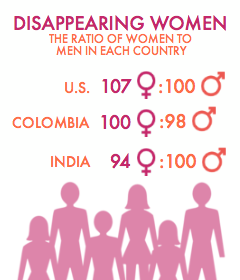
December 3, 2012 | Politics and Leadership
The Dilma Effect
How Brazil's groundbreaking president is inspiring other women to run.
By Maya Popa
“In Portuguese, the term presidente applies to both men and women, and presidenta to women only. When Dilma was elected, people asked her which term she preferred to use and she said presidenta, with the feminine ending.”
“Dilma,” it almost goes without saying, is Dilma Rousseff, voted into office in 2010 as the first woman to lead powerhouse Brazil, the world’s sixth largest economy. For the woman telling that anecdote, thirtysomething Veronica Marques of Rio, it illustrates one of Rousseff’s greatest accomplishments in office: Her ability to motivate other women to succeed, especially in public life. “For me, this simple gesture shows how having a woman as a presidenta can inspire other women not only to seek more space in the political arena, but also through their daily lives,” says Marques, an executive at ELAS, the Women's Social Investment Fund, a nonprofit that invests in women’s empowerment and education.
The Dilma Effect starts at the top: After promising in her inaugural speech “to open doors, so that in the future many other women can also be president,” Rousseff put together a cabinet with three times as many women as the previous administration, giving women nine of the 24 minister-level positions--including such key jobs as ministers of planning, social development and the environment.
And in this macho, macho country, thanks to Rousseff, more women are getting into politics than ever before. "Dilma took several high-profile media opportunities to encourage women to run in the last elections,” says Heather Arnet, CEO of the Women and Girls Foundation of Pennsylvania, which is partnering with ELAS to study the effect of governmental policies on the lives of Brazilian women. The result: A record 48 women sought the chance to head Brazil’s 26 states, a 60 percent increase over the previous contest.
But the fight for gender equality is hardly won. Although Brazil has a 30 percent rule—requiring that 30 percent of candidates for elective office be women—females hold only nine percent of positions in the lower house of parliament and only 36 percent of lawmaker, senior official and managerial jobs, according to a 2011 report by the World Economic Forum. “There is a long way to go to have more women in politics, but we are building step by step,” says Marques. “Maybe, in some years we will have at least 50 percent of women in political positions in Brazil.”
Politics, though, isn’t the only area where Brazilian women are breaking glass ceilings. Earlier this year Maria das Graças Silva Foster was named CEO of Petrobras-Petróleo Brasil--the first woman in the world to head a major oil-and-gas company. According to a recent survey, 80 percent of Brazilian women now aspire to top jobs (compared to 52 percent in the U.S), while 59 percent consider themselves “very ambitious” (compared to 36 percent in the U.S.) Arnet praises government-funded social programs for providing the right conditions for women to succeed: inexpensive, over-the-counter birth control, six months paid maternity leave, efforts to connect rural women to education and healthcare, and the bolsa familia program, compensation for poor women to keeping their children in school. "All of these policies and cultural practices together are creating an environment where women can be more economically sufficient and can take on increasing corporate and political leadership," says Arnet.
Marques, though, has the most personal take on her country’s leader: “When I see myself represented by a woman as presidenta, I see that things are changing. I see that our generation of women and the next generation of women will have more space in the political arena because of her. Achieving in the political arena is not simple. Brazil has to give us—the new generation of women—the space and the opportunity for it. We want to do it, we can do it, we will do it.”
SOLUTIONS FOR BRAZIL: Let’s Go Girls!
The Women and Girls Foundation of Pennsylvania, led by Heather Arnet, is partnering with Veronica Marques at ELAS, on a project called Vamos Meninas! (Let's Go Girls!) to "explore the role that Brazilian voting practices, economic policies, and policies regarding family planning and child care have in fostering a culture for female advancement."
In January 2013, Arnet and ELAS will visit Rio, Sao Paulo, Brasilia and other cities, to better understand the changes occurring in Brazil and their impact on women’s leadership. As Arnet explains: "Together we hope to capture stories of transformation that provide Americans insight into this emerging world economic leader, and inspiration to continue our own pursuit towards gender equity."
Explaining what seems an unlikely pairing, Arnet says that “Brazil and Pennsylvania, historically, have a surprising amount in common. We are both economies which used to rely mainly on coal mining. We are traditionally macho cultures where women stayed home, and had children, and men went to work in the factories. We have had significant racial and class segregation and gender segregation in the workplace. And yet look at Brazil now. From an economic revitalization perspective and gender leadership perspective things are changing in Brazil dynamically.”
A documentary about Vamos Meninas! will premiere on PBS station WQED/Pittsburgh later in 2013. Says Arnet, "We have a lot to learn from Brazil, its people and its leaders, regarding how to transform our culture and our economies for a new century."
Maya Catherine Popa is a writer for the Women in the World Foundation. She is currently completing a Master's in Creative Writing at Oxford University under a Clarendon Scholarship, as well as an MFA in Poetry from NYU. She co-leads a weekly writing workshop for veterans of Iraq & Afghanistan. Her writing appears in The Huffington Post, Locustpoint, and elsewhere.